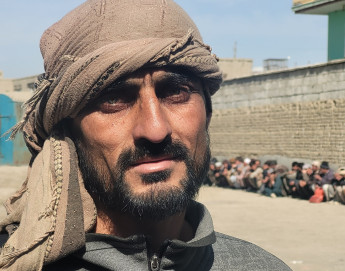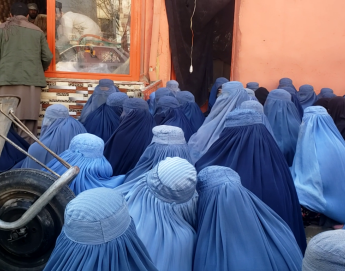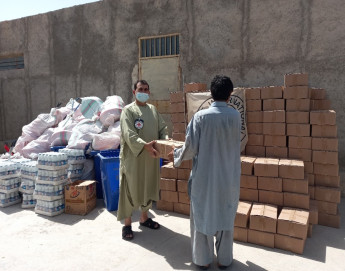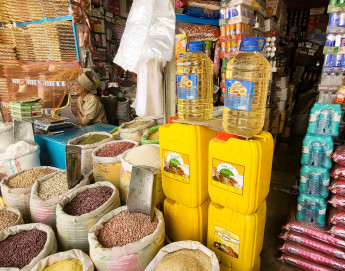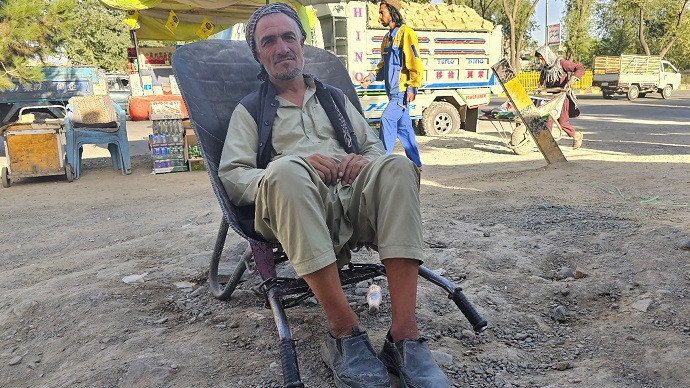
Afghanistan: Facing an uncertain economic future and persistent unemployment

Sitting by the roadside with his wheelbarrow, the 43-year-old says he manages to earn only about 100 to 150 Afghanis ($1.3 to $2.2) a day, which is not enough even to buy the bare essentials for his family. According to recent figures released by World Food Programme, the average cost of a food basket for Afghanistan is 6,300 AFN ($94) per month. "My family has been frequently going to bed on empty stomachs because I simply don't have the means to provide for them," says Hazrat.
Not too far from Hazrat sits 61-year-old Sayed Ali Khan, who works as a cobbler. "I make about 100 Afghanis ($1.4) a day. I sit in my spot the whole day, be it hot or freezing cold, to somehow feed my family. But there are many days when I don't make enough money to buy food for them," he says.
The anxiety and uncertainty on the faces of Hazrat and Khan reflect the severe economic crisis that people in the country are currently facing as a result of the compound impact of years of drought, natural disasters such as floods and earthquakes, the suspension of financial aid by international donors and sanctions imposed on banks. While there has been significant reduction in fighting after August 2021 and the cost of staple foods has come down in comparison to 2022, the economy has witnessed a contraction of 25 per cent over the last two years.
Like Hazrat, a growing number of people are unable to find work, which in turn has severely impacted their purchasing power. According to some figures from the World Bank, one in every two people in Afghanistan is currently living in poverty and 15 million people in the country are suffering from food insecurity.

Sayed Ali Khan, 61, has been braving the weather every day to somehow feed his family. Photo: (Mohammad Masoud SAMIMI/ICRC)
According to a recent report by Save the Children, one-fifth of Afghan families are being compelled to send their children to work because of the decline in income sources. An estimated one million children are now having to work and most of these families are headed by women, for whom participating in the labour market is particularly challenging.
"The International Committee of the Red Cross (ICRC) recognizes the country's economic difficulties and that over half the population is in dire need of humanitarian assistance. We have been working to ensure that households and communities affected by conflict or armed violence can meet essential needs and maintain or restore sustainable livelihoods," says Ursula Kayali, the ICRC's economic security coordinator in Kabul.

The ICRC's cash-for-work programme engages members of the community to build sustainable irrigation systems and protect their land while earning an income. Photo: (ICRC)
Kayali explains that the ICRC takes a proactive approach in supporting communities by implementing cash-for-work construction projects to restore their livelihoods while protecting their land from erosion and maintaining a sustainable irrigation system. During the first half of 2023, the ICRC helped 933 families (7,455 people) earn an income through cash-for-work projects in Gulistan, Nader Shakor, Hesarak and Nawzad districts of Farah, Khost, Panjshir and Helmand provinces. Besides, we supported 2,800 farmers' families through cash assistance for agricultural inputs and training in efficient farming methods in 2023.
The ICRC is also currently implementing projects such as building a check dam and retaining walls and repairing irrigation canals in Kandahar, Herat, Baghlan and Balkh provinces. This is providing additional job opportunities to benefit over 3,000 people.

Community members helped to repair and build three irrigation canals spanning four kilometres in Moqbal and Zani Khail villages. Photo: (ICRC)
The ICRC's efforts to protect lives and restore livelihoods has made a difference for people in Moqbal and Zani Khail villages in eastern Khost province. The project provided a short-term income source for the villagers and the irrigated lands will become a long-term source of income and food for them.
"We are very happy that these projects benefited 12,000 people in our villages this year because, in the last two decades, no development work was done here. Our lands will be irrigated now and we will have a source of income. We want more such life-saving projects because many people in our area are suffering from poverty," shares Abdul Rahman, a leader in his community.

